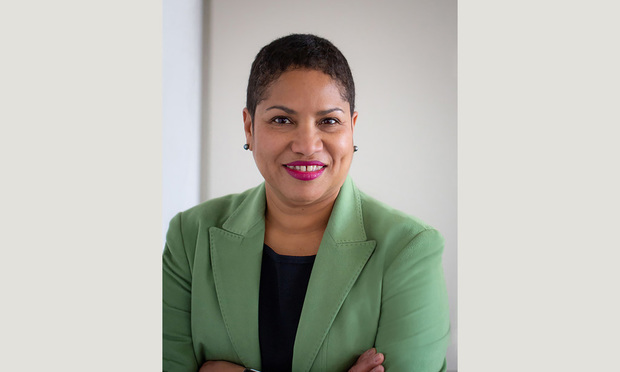Crowell & Moring's Natalie Ludaway on the New Landscape for State AGs
The former D.C. chief deputy attorney general discusses her perspective on the growing practice and her client work on issues like price gouging during the COVID-19 pandemic.
April 22, 2020 at 10:00 AM
6 minute read
 Natalie Ludaway, with Crowell & Moring.
Natalie Ludaway, with Crowell & Moring.
For the last five years, Natalie Ludaway served as the chief deputy attorney general for the District of Columbia, taking a leading role in building the office into an agency on par with the best state attorneys general. (With admiration, Ludaway labels those who holds the roles as "the people's lawyers.")
It was a time when state attorneys general nationwide were flexing their muscles as never before, filling the litigation gaps left by the Trump administration's deregulation juggernaut.
In March, Ludaway left her position in the D.C. Office of the Attorney General to join Crowell & Moring's state attorneys general enforcement and investigations practice. It's one of a growing number of law firms that are beefing up that practice area in response to litigious state attorneys general. She also arrived as the coronavirus outbreak was capturing the world's attention—a crisis that is engendering its own wave of state attorney general litigation. We reached out to Ludaway for her perspective on both sides of this growing practice. Our interview with Ludaway has been edited for space and clarity.
You said you originally planned to stay at the D.C. attorney general's office for two years, but you stayed for five. What innovations are you most proud of?
When I arrived at the office, it was focused on being a defensive attorney general's office. I came with the mission and purpose for the office to, of course, provide excellent counsel and excellent lawyers, but to really move more towards being an affirmative office, where the office would focus on helping the most vulnerable residents in the city.
We stood up a first-class consumer protection office. That division focused on addressing slumlord issues. You know, for several years, the office has gone after slumlords who do not provide livable housing conditions. Very proud of that work.
During your tenure there, it seems many state attorneys general have become more litigious and aggressive than before and have changed the legal landscape. Why has this occurred?
The federal government has pulled back from areas in consumer protection and antitrust, in the environment, and the states have stepped up.
The work needs to be done. But also the community of attorneys general, while there are certainly partisan issues, is still an area where people work collaboratively and well across party lines.
I do think that the Trump administration and its policies have left a void, but I don't think [the litigation] is only because of the Trump administration. You look at price gouging, for example. Price gouging is an issue that every attorney general is looking at regardless of party affiliation. You look at the opioid crisis. The opioid crisis isn't based on party affiliation. It's based on people.
Why did you leave the attorney general's office and head to Crowell & Moring?
 You know, I felt I did what I came to do in terms of setting up the office. I really just wanted another opportunity. I was attracted to Crowell. What makes Crowell & Moring a special place is the leadership, and I have to say as we go through this time, the leadership in the firm matters. The work that I want to do is counseling clients to give them advice. I had the opportunity to see many, many, many companies come before attorneys general and to be part of discussions and hear attorneys general's views. Combined with my 25 plus years before joining the district's AG office and those five years, I have a good set of skills to advise and represent companies. I know the office is in good hands.
You know, I felt I did what I came to do in terms of setting up the office. I really just wanted another opportunity. I was attracted to Crowell. What makes Crowell & Moring a special place is the leadership, and I have to say as we go through this time, the leadership in the firm matters. The work that I want to do is counseling clients to give them advice. I had the opportunity to see many, many, many companies come before attorneys general and to be part of discussions and hear attorneys general's views. Combined with my 25 plus years before joining the district's AG office and those five years, I have a good set of skills to advise and represent companies. I know the office is in good hands.
Why have so many law firms have launched state attorney general practices?
I think that in order to fully advise a client, it's not just looking at federal regulations and enforcement but you've got to look at what state attorneys generals are going. They are a powerful and active group. You know, they are the people's lawyers. You cannot operate without also getting advice regarding a state attorney general. They are a group that not only works as a single unit but quickly can work in terms of a region. Just as COVID-19 doesn't have any borders, the same with attorneys general.
What kind of litigation from state attorneys general are you seeing related to the coronavirus pandemic?
The firm has a very strong multidisciplinary working group advising clients on how to navigate the business legal and operational challenges associated with the pandemic. I am part of that team and help to advise clients. Of course, companies, I believe, want to stay on the right side of the law. We are advising on issues regarding price gouging, supplier chain issues, and issues related to false advertising and refunds. There's also the issue of recurring contracts, recurring services. You can have a situation where the claims made are regarding the safety of a product. In this COVID-19 era, a company could receive a letter on why did your price go from X to Y?
And then you get to other issues, like making certain that companies are following disconnection rules, for example. Many jurisdictions have passed laws that you're not permitted to disconnect utility service or mortgages or those types of things.
In a case where there are disconnections, for example, do you defend that for a company?
Well, first you find out what the company would be doing, right? Just as when I was in the AG's office, the assumption is just because something occurred doesn't necessarily mean that it was impermissible, right? The first thing is to look at why it occurred and to explain to the office why it occurred and, if necessary, make adjustments.
The best advice I could ever give to a company is that when an AG office sends a letter or has a question, respond to and engage with the office. You want to build a relationship. That's the reason for having experienced counsel who has been in an AG office. You're not going to agree 100% of the time, but at least you get to a point where you understand what you're disagreeing on.
This content has been archived. It is available through our partners, LexisNexis® and Bloomberg Law.
To view this content, please continue to their sites.
Not a Lexis Subscriber?
Subscribe Now
Not a Bloomberg Law Subscriber?
Subscribe Now
NOT FOR REPRINT
© 2025 ALM Global, LLC, All Rights Reserved. Request academic re-use from www.copyright.com. All other uses, submit a request to [email protected]. For more information visit Asset & Logo Licensing.
You Might Like
View All
'Religious Discrimination'?: 4th Circuit Revives Challenge to Employer Vaccine Mandate
2 minute read
4th Circuit Revives Racial Harassment Lawsuit Against North Carolina School District
3 minute read

DOJ, 10 State AGs File Amended Antitrust Complaint Against RealPage and Big Landlords
4 minute readLaw Firms Mentioned
Trending Stories
Who Got The Work
J. Brugh Lower of Gibbons has entered an appearance for industrial equipment supplier Devco Corporation in a pending trademark infringement lawsuit. The suit, accusing the defendant of selling knock-off Graco products, was filed Dec. 18 in New Jersey District Court by Rivkin Radler on behalf of Graco Inc. and Graco Minnesota. The case, assigned to U.S. District Judge Zahid N. Quraishi, is 3:24-cv-11294, Graco Inc. et al v. Devco Corporation.
Who Got The Work
Rebecca Maller-Stein and Kent A. Yalowitz of Arnold & Porter Kaye Scholer have entered their appearances for Hanaco Venture Capital and its executives, Lior Prosor and David Frankel, in a pending securities lawsuit. The action, filed on Dec. 24 in New York Southern District Court by Zell, Aron & Co. on behalf of Goldeneye Advisors, accuses the defendants of negligently and fraudulently managing the plaintiff's $1 million investment. The case, assigned to U.S. District Judge Vernon S. Broderick, is 1:24-cv-09918, Goldeneye Advisors, LLC v. Hanaco Venture Capital, Ltd. et al.
Who Got The Work
Attorneys from A&O Shearman has stepped in as defense counsel for Toronto-Dominion Bank and other defendants in a pending securities class action. The suit, filed Dec. 11 in New York Southern District Court by Bleichmar Fonti & Auld, accuses the defendants of concealing the bank's 'pervasive' deficiencies in regards to its compliance with the Bank Secrecy Act and the quality of its anti-money laundering controls. The case, assigned to U.S. District Judge Arun Subramanian, is 1:24-cv-09445, Gonzalez v. The Toronto-Dominion Bank et al.
Who Got The Work
Crown Castle International, a Pennsylvania company providing shared communications infrastructure, has turned to Luke D. Wolf of Gordon Rees Scully Mansukhani to fend off a pending breach-of-contract lawsuit. The court action, filed Nov. 25 in Michigan Eastern District Court by Hooper Hathaway PC on behalf of The Town Residences LLC, accuses Crown Castle of failing to transfer approximately $30,000 in utility payments from T-Mobile in breach of a roof-top lease and assignment agreement. The case, assigned to U.S. District Judge Susan K. Declercq, is 2:24-cv-13131, The Town Residences LLC v. T-Mobile US, Inc. et al.
Who Got The Work
Wilfred P. Coronato and Daniel M. Schwartz of McCarter & English have stepped in as defense counsel to Electrolux Home Products Inc. in a pending product liability lawsuit. The court action, filed Nov. 26 in New York Eastern District Court by Poulos Lopiccolo PC and Nagel Rice LLP on behalf of David Stern, alleges that the defendant's refrigerators’ drawers and shelving repeatedly break and fall apart within months after purchase. The case, assigned to U.S. District Judge Joan M. Azrack, is 2:24-cv-08204, Stern v. Electrolux Home Products, Inc.










